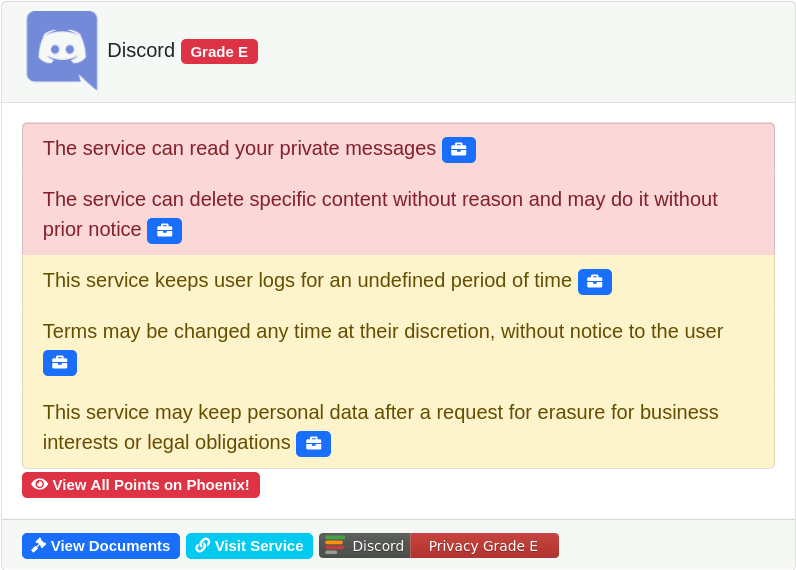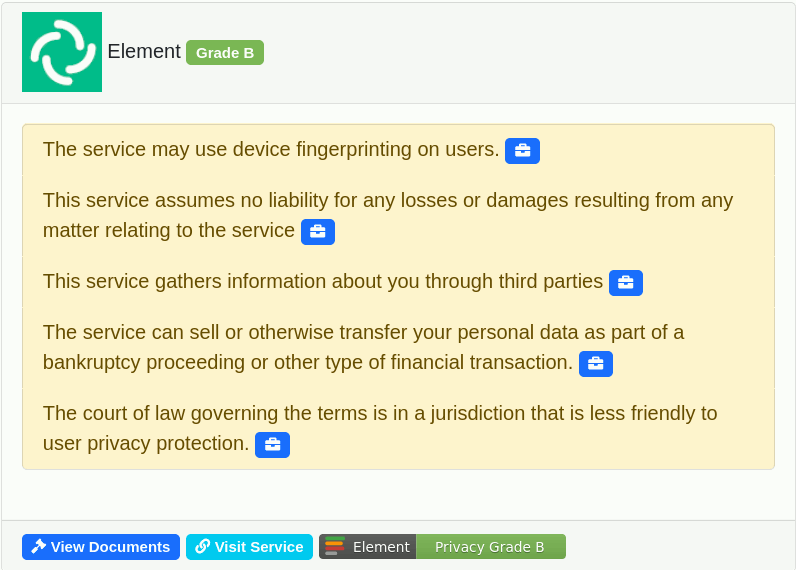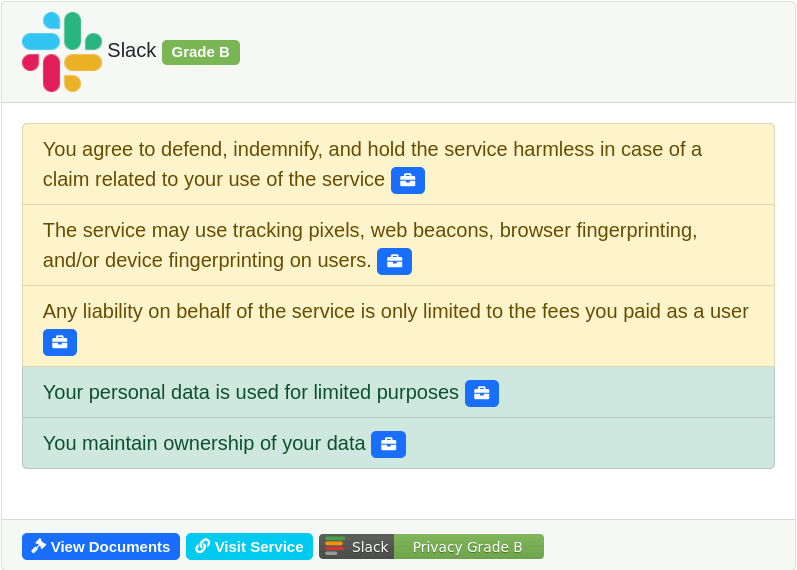My discord with Discord, or choosing alternatives with better terms of service
For over a year we have been living in a pandemic. Those of us that can, do avoid leaving home as much as possible. The ensuing feeling of isolation and need to connect to others has driven us to use online services more and more, which has led applications like Zoom and Google Meet to experience a staggering amount of growth.
The same has also happened to group chat with audio/video applications like Discord. Everyone and their neighbor has been either creating a new online community on Discord (oddly called “servers”, even though they are not servers in a strictly technical sense (internally they’re called “guilds”, according to this Reddit thread)), or moving to Discord their online community that existed some place else.
It’s safe to assume that, sadly, very few people do actually read Discord’s terms of service and privacy policy. According to online reading time estimators, to read both documents completely one would take almost an hour. Of course, that would hold true for most online services today on the internet. After all, who has the time nowadays to sit through the hour or more of boring legalese that comprises most companies’ terms of service and privacy policies? If, like most people, you haven’t read them, you think that there’s probably some nasty stuff there, but users have no bargaining power when the alternative to accepting it is getting no service at all. Or do they?
Terms of Service, Didn’t Read
Thankfully, a project named ToS;DR, or Terms of Service, Didn’t Read (a play on the common internet slang TL;DR – too long, didn’t read) aims to change that. There you can find out quickly how much nasty stuff (or perhaps, with some luck, maybe some good stuff) is buried within those walls of text.
ToS;DR started in 2012, based on an idea originated in the 2011 Chaos Communication Camp in Germany and the Unhosted movement. The project is funded by non-profits and also counts with the work of volunteers. It’s also open source. You can contribute financially, by collecting and reviewing documents, or with code.
The quickest way you can have a look at how much user friendly a service’s terms and conditions are is by glancing at the ToS;DR grade for that service. ToS;DR also has browser extensions that will show you the grade for any website you’re visiting, if they have already been evaluated. The DuckDuckGo search engine also uses ToS;DR ratings on its Privacy Essentials browser extension for the desktop and Privacy Browser for mobile.
If you want to delve into the details of the review of the terms of service, see the reason for the attributed grade, or have a summary of the main issues with them, you can look at the full list by clicking the “view all points on Phoenix” button. Let’s see an example with Discord’s ToS;DR evaluation. Every point they make is linked to and quotes a specific excerpt of text from the services’ legal document.
How good (or bad) are Discord’s ToS and privacy policy?
Discord gets a grade E on ToS;DR. That is the lowest possible grade and, for comparison, it is the same grade assigned to Facebook. But why?

Let’s take a look at the good, the bad and the ugly as the reasons for Discord receiving a grade E. As a disclaimer, I have been involved as a volunteer including and rating other services in ToS;DR, but I have absolutely no involvement with their rating of Discord.
The good
The green lines on that page represent points present in the service’s legalese documents that are considered to be good for users.
Not everything is bad with Discord’s conditions. There are some good points. Most of them were likely put there to comply with European GDPR:
- you can request access to your personal data,
- they may get your consent before they transfer you data to third parties, and
- there is a complaint mechanism for handling of personal data.
Others are good practices that more companies should adopt. The service will disclose users’ information only under limited conditions, and if some company sends a copyright take down notice to remove content you posted, the service offers you the opportunity to defend yourself.
Discord promises not to sell your personal data, and you can leave it at any time.
If the terms of service are going to change, Discord promises to notice users at least seven days in advance. That’s good to know. Some other companies are in the bad habit of changing their terms of service and privacy policy without notice to the users and making it effective immediately. Who checks every day the ToS and Privacy Policy of every service they have ever registered to and compare to see if anything changed? Nobody does that, of course. Except the ToS;DR bots: they do exactly that for you. So that’s good to know.
Sadly, for some reason Discord decides that the same does not apply to its privacy policy, which can change at any time, without prior notice. I cannot imagine what strange reason they might have to have completely different update policies for both documents, but they get a bad point for this.
The bad
There is plenty to dislike here. Some have to do with content moderation, which is never transparent on the reasons (or rather, lack of reasons) for arbitrarily removing access or content.
Many relate to user tracking, advertising and licensing content to third parties. Still others appear intent on limiting the ability of users to access the judicial system for disputes if they need it, such as waiving the right to a class action and subjecting to forced binding arbitration.
The list is very long and I advise you to look it up yourself – it’s still a much shorter and more concise summary of the companies’ original documents they review.
The ugly
The worst of the clauses, called “blocker” cases by ToS;DR, are marked in red. The service gets a few of those.
Discord collects your private messages, images and voice conversations, with a remark that the latter of those is only used to enable communication delivery, as described in their privacy policy:
Information we collect may include but not be limited to username, email address, and any messages, images, transient VOIP data (to enable communication delivery only) or other content you send via the chat feature.
However, later in the privacy policy, in the section on “our use of your information”, they say they can use this information for marketing communications as well as send it to third parties for advertisement purposes, but at least you can opt-out of both, which warrants “good” points in ToS;DR.
For some reason, that paragraph above warranted the “service can read your private messages” case in ToS;DR, which is a “blocker”. Perhaps because it’s not clear in the privacy policy what they do with those private messages and it’s perfectly reasonable to assume that the clauses about third party advertisement and marketing communications do include that information.
Waiving your moral rights over any feedback given is also a “blocker” point, and it’s not even legal to do so under some jurisdictions.
Another “blocker” point comes from the following excerpt from the ToS:
The Company reserves the right to remove and permanently delete Your Content from the Service with or without notice for any reason or no reason.
It also states that your account can be deleted without a reason at any time, although that warrants only a “bad”, not “blocker” point in ToS;DR.
The Company may terminate your Account and your access to the Service (or, at the Company’s sole option, applicable portions of the Service) at any time and for any reason. The Company is not required to provide you with any notice or warning prior to any such termination.
Unfortunately, it’s too common to see such clauses in companies’ ToS. While it’s understandable from a business perspective that a company offering a service would want to reserve the right to remove any content at any time, this is not what users might want, like or expect. As public discourse moves more and more to the online realm, and the tech monopolies concentrate control over those platforms (consider that not long ago Discord was rumored to be in negotiations to be acquired by Microsoft for $ 10 billion, but later turned it down to pursue its own IPO), the place of discourse shifts from the private to the public realm, with all the implications that comes with it. Content moderation becomes an increasingly difficult challenge, as in some cases it may not be always obvious to determine whether some speech is lawful free speech or should be removed.
That is an ongoing debate involving researchers, internet specialists, activists, politicians and others around the world as people ask for scrutiny and transparency on the policies and reasons behind moderating decisions, blocking and removing content. Who hasn’t heard of a friend or acquaintance that has lost access to years of data they gathered in a service when a faceless, giant company decided to block them, citing generic “terms of service violations” as the reason, without pointing which specific action they did warranted the punishment, or which specific clause was violated?
Terms of service grade
Besides the aforementioned good, bad and blocker points, some aspects that are also important in the terms of service and privacy policies, but don’t warrant either gaining or losing points for the grade system are considered to be “neutral points”. Even though they don’t influence the final grade, you are advised to read them too, as they all affect your relationship with the service provider.
In the end, the service grade is calculated by weighing and summing all of the points registered for all of its documents (usually the terms of service and privacy policy, but some services have more complicated arrangements). For instance, some bad cases are considered more severe than others, so they subtract more points to the overall score. Likewise, some good points are more important than others, so they add more points. The grade rating system is described here.
In the end, Discord gets a grade E, which means that
the terms of service raise very serious concerns.
Competitors with better ToS
Now that we have figured out the reasons why Discord’s conditions for offering the service “for free” are not really so good, we can ask ourselves what alternatives are out there and if any of them have better terms of service and privacy policies. As it turns out, yes, and here are some of those. We also look at the features they offer, so you can compare them and not lose much when you leave Discord (or never enter it in the first place).
Matrix
Matrix is not really a service, but rather an open, secure and distributed protocol for interoperable communication services. In the tech monopoly’s communication services you depend on a single company making moderating decisions and not allowing you to communicate with users outside their walled garden. With Matrix, instead, you get to choose your own provider or even run one yourself, while still being able to communicate with everyone in the Matrix network. Think of it like email, but with end-to-end encryption, easy to use interfaces, voice and video communication and much more. Please see Matrix’s own website for a complete overview of its features.
Even better is the fact that you can start slowly migrating, or even experimenting, your community to Matrix. One of its features is bridges that will sync your conversation with many other messaging services, including Discord, mirroring the channels. That way, people on Matrix can communicate with your community on the other service back and forth, as if they were using the same service. It’s the kind of interoperability the big companies don’t want you to have.
To use Matrix you will need to use a Matrix client (think of it as an app that gives you access to the network). The leading free and open source Matrix protocol client is Element. One company offering a messaging service using Element is New Vector Ltd. So let’s take a look at their terms of service.

There are a few points that may cause concern, but they do not seem so serious in comparison to Discord’s. Element gets a Grade B, which means that
the terms of services are fair towards the user but they could be improved.
With that in consideration, creating a mirror of your Discord community in Matrix and bridging the services seems to be a good idea for any community.
Slack
Another popular message channel service that many people use for community building is Slack. Unlike Element, which is free and open source software, Slack is proprietary. That means that it might be bought by Big Tech in the future, with everything that it entails. Slack also lacks functionality offered by Discord and Element like voice and video calls.
On the other hand, Slack offers APIs for integration with many other services and that is one reason for it to be still popular.
Also their terms of service are better rated than Discord’s and receive the same grade as Element’s.

Other services
For comparing other services, feel free to look them up on ToS;DR. If you can’t find a service, please make a new service request and it will be eventually reviewed and added by the ToS;DR staff of volunteers.
Conclusion
If, like most people, you never pay attention to terms of service and privacy policies that you click to accept, you now have a tool at your disposal to be able to look at a glance and see how good or bad a company promises to treat you and your data.
Besides ToS;DR, there are also other sources that provide curated lists that can help you discover and choose services that respect you and your privacy. A couple of sites I like to use are privacytools.io and switching.software.
Discord has terms of service and privacy policies that, according to ToS;DR, are pretty much unfavorable to the user. Fortunately it is relatively easy and painless to switch to Element, and even keep the possibility to communicate with people who haven’t yet decided to leave Discord.